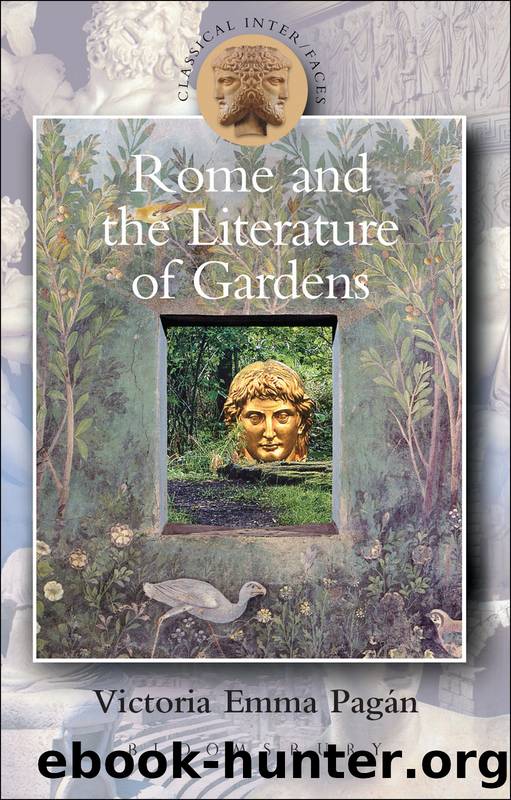Rome and the Literature of Gardens by Victoria Emma Pagán

Author:Victoria Emma Pagán [Pagán, Victoria Emma]
Language: eng
Format: epub
Tags: history, Ancient, Rome, Europe, General
ISBN: 9781472502520
Google: McPUAAAAQBAJ
Publisher: A&C Black
Published: 2013-10-10T23:54:01.166262+00:00
IV
Behind Messalina, Claudius, Narcissus, behind the sexual indiscretion and the grisly murder, behind all that transpires in Annals 11 looms the figure of the able Republican general Lucius Licinius Lucullus, original owner of the garden. It would be very easy to identify Lucullus with greed, avarice, luxury, and extravagance. For instance, to construct his villa in Campania, he defied nature and built out over the sea and dug into mountainsides. Stories about his luxurious dining habits are ubiquitous. His dining room was equipped with an aviary; his guests drank from cups thickly encrusted with jewels; he punished a slave who brought him a modest meal although he was dining alone. Lucullus is easily a symbol of excessive, decadent living; however, there is more to the man than the stories of his late biographer Plutarch, who relied on an already well established negative literary heritage that systematically blackened Lucullusâ character. Attention to his whole career adds another dimension to his gardens in Rome as an especially meaningful setting for the demise of Messalina.
Lucullus began his career under Sulla as a military tribune in the Social Wars. From 88 to 80 BCE he served as a treasurer in the east; thus he was in Asia during the dreaded proscriptions of Sulla and avoided participation in the man-hunts and slaughter. He was elected consul in 74; after his consulship, he was given command of forces in the east, where he spent all of his efforts attempting to subdue Mithridates, king of Pontus. When reading Annals 11, the reader is struck by the predominance of material on Parthia and Armenia. Keitel argues that Tacitus creates a âcontrapuntalâ effect between events at Rome and those in the East; dynastic intrigue and instability threatens both Parthia and Rome (Keitel 1978). Such prolonged accounts of Parthia and Armenia in Annals 11, however, also cause the reader to reflect on the long standing enmity between Rome and Parthia. Lucullus was one of the earliest leading players in that conflict.
The ancient state of Armenia was located between the two powerful empires of Rome and Parthia. The hope of conquering Armenia and increasing its status in the Empire from a client-kingdom to a province continually tempted Roman generals. Having achieved success against Mithridates, Lucullus carried the war into Armenia in 69 BCE and occupied the city of Tigranocerta, which he so thoroughly dismantled that it was never to be an important city again. He continued toward the capital city of Artaxata but his effort ultimately failed because of hesitation, mismanagement, and insubordination. By 67, Lucullusâ political enemies in Rome insisted that he step down; he had held command long enough. In 66, the Senate passed the Lex Manilia, handing over all military command to Pompey. Lucullus was unceremoniously relieved of his duty and returned to Rome.
Because of the political opposition that favoured Pompey, Lucullus had to wait three years before he could hold his triumphal procession. In 59 BCE he attempted to stop the ratification of Pompeyâs eastern arrangements and veteran settlements; his failure to do so only brought him disgrace.
Download
This site does not store any files on its server. We only index and link to content provided by other sites. Please contact the content providers to delete copyright contents if any and email us, we'll remove relevant links or contents immediately.
How to Be a Bawse: A Guide to Conquering Life by Lilly Singh(7472)
Spare by Prince Harry The Duke of Sussex(5176)
Millionaire: The Philanderer, Gambler, and Duelist Who Invented Modern Finance by Janet Gleeson(4465)
Machine Learning at Scale with H2O by Gregory Keys | David Whiting(4293)
Never by Ken Follett(3937)
Harry Potter 02 & The Chamber Of Secrets (Illustrated) by J.K. Rowling(3673)
The Heroin Diaries by Nikki Sixx(3543)
Urban Outlaw by Magnus Walker(3392)
Fairy Tale by Stephen King(3370)
Harry Potter and the Prisoner of Azkaban (Book 3) by J. K. Rowling(3350)
Japanese Design by Patricia J. Graham(3167)
The Man Who Died Twice by Richard Osman(3072)
The Club by A.L. Brooks(2919)
Will by Will Smith(2911)
Stacked Decks by The Rotenberg Collection(2880)
Harry Potter and the Deathly Hallows (7) by J.K. Rowling(2714)
Churchill by Paul Johnson(2578)
The Chimp Paradox by Peters Dr Steve(2383)
Borders by unknow(2303)
